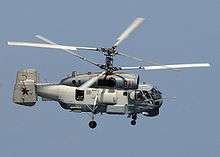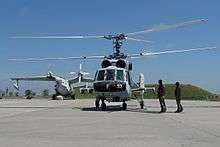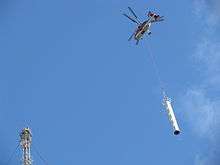Kamov Ka-27
| Ka-27 | |
|---|---|
| | |
| A Russian Navy Ka-27PS | |
| Role | Anti-submarine warfare helicopter |
| National origin | Soviet Union/Russia |
| Manufacturer | Kamov |
| First flight | 24 December 1973[1] |
| Introduction | 1982 |
| Status | In service |
| Primary users | Soviet Navy (historical) Russian Navy Ukrainian Navy Indian Navy |
| Produced | 1981-present |
| Number built | 267 |
| Developed from | Kamov Ka-25 |
| Variants | Kamov Ka-31 |
The Kamov Ka-27 (NATO reporting name 'Helix') is a military helicopter developed for the Soviet Navy, and currently in service in various countries including Russia, Ukraine, Vietnam, People's Republic of China, Republic of Korea (South Korea), and India. Variants include the Ka-29 assault transport, the Ka-28 downgraded export version, and the Ka-32 for civilian use.
Design and development
The helicopter was developed for ferrying and anti-submarine warfare. Design work began in 1969 and the first prototype flew in 1973. It was intended to replace the decade-old Kamov Ka-25, and is similar in appearance to its predecessor due to the requirements of fitting in the same hangar space. Like other Kamov military helicopters it has coaxial rotors, removing the need for a tail rotor. Ka-32 variants, e.g. the Klimov-powered Ka-32A11BC, have been certified for commercial operations throughout the world, notably in Canada and Europe.
Operational history

A Russian Navy Ka-27 helicopter from the Russian Udaloy-class destroyer RS Severomorsk (DDG 619) conducted interoperability deck landing training on board USS Mount Whitney on 22 July 2010.[2]
Ka-32A11BC multipurpose helicopters have been successfully operated in Portugal for over five years. In 2006, KAMOV JSC won the tender for the supply of Ka-32A11BC firefighting helicopters, to replace Aérospatiale SA-330 Pumas, which have very high operating costs.
The Ka-32A11BC features a high power-to-weight ratio and ease of handling, owing to its coaxial rotor design. The rotors' diameters are not restricted by the presence of a tail rotor and associated tail boom; this facilitates maneuvering near obstacles and helps assure exceptional accuracy when hovering in heavy smoke and dust conditions. The Ka-32A11BC may be equipped with the Bambi Bucket suspended fire-fighting system of up to five tons capacity. The service life has been extended to up to 32 000 flight hours.[3]
Since the 1990s, China has purchased the Ka-28 export version and Ka-31 radar warning version for the PLAN fleet. Ka-31 purchases were first revealed in 2010. It is believed that Chinese Ka-28s have been equipped with more enhanced avionics compared to Ka-28s exported to other countries.[4]
In 2013, Russia tested the new Kamov Ka-27M with an active electronically scanned array radar. The basis of the modernization of the Ka-27M is installed on the helicopter airborne radar with an active phased array antenna FH-A. This radar is part of the command and tactical radar system that combines several other systems: acoustic, magnetometric, signals intelligence and radar. All the information on them is displayed on the display instrumentation.
Ka-32s are used for construction of transmission towers for overhead power lines, as it has somewhat higher lift capacity than the Vertol 107.[5] In Canada, the Ka-32 is used for selective logging as it is able to lift selective species vertically.[6]
In August 2013, a Kamov Ka-32, C-GKHL operating in Bella Coola, Canada, experienced failure of one of its Klimov TV3-117BMA engines (manufactured by Motor Sich in Ukraine). The subsequent technical investigation indicated that there was poor quality control in the assembly of the compressor turbine, leading to failure of the complete unit after several compressor blades separated.[7]
Ka-27's have been used by the Syrian Navy during the ongoing Syrian Civil War. [8]
Variants


- Ka-25-2
- First prototype.
- Ka-27K
- Anti-submarine warfare prototype.
- Ka-27PL
- (Helix-A) Anti-submarine warfare helicopter.
- Ka-27PS
- (Helix-D) Search and rescue helicopter, ASW equipment removed and winch fitted.
- Ka-27PV
- Armed version of the Ka-27PS.
- Ka-27M
- The latest modification of the helicopter, equipped with radar and tactical command systems that include the following systems: acoustic sensors, magnetometric sensors, signals intelligence, and FH-A radar with active phased array antenna. The radar is mounted under the fuselage and provides all-around vision in the search and detection of surface, air, and ground targets. Serial upgrading of Ka-27Ms to the level of combatant helicopters was planned to begin in 2014. By the end of 2016, 46 Ka-27PLs had been scheduled for modernization, commissioned by the Russian Navy. The first eight serial Ka-27M were transferred in December 2016.[9][10]
- Ka-28
- (Helix-A) Export version of the Ka-27PL.

- Ka-29TB
- (Helix-B) Assault transport helicopter, with accommodation for two pilots and 16 troops.
- Ka-252RLD
- A radar picket variant of the Ka-31 early warning helicopter first displayed in 2008. RLD designation: radiolokatsyonnogo dozora. Two units delivered to Russian MoD by 2010.[11]

- Ka-32A
- Civil transport helicopter. Initial production version.
- Ka-32A1
- Fire fighting helicopter, equipped with a helicopter bucket.
- Ka-32A2
- Police version, equipped with two searchlights and a loudspeaker.
- Ka-32A4
- Special search and rescue, salvage and evacuation version.
- Ka-32A7
- Armed version developed from the Ka-27PS.
- Ka-32A11BC
- Canadian, Chinese, European-certified version with Klimov TV3-117MA engines and Glass Cockpit.[12]
- Ka-32A12
- Swiss-registered and approved version.
- KA-32C
- Little-known custom version.
- Ka-32M
- Projected development with 1839kW TV3-117VMA-SB3 engines. Probably replaced by the Ka-32-10 project.
- Ka-32S
- (Helix-C) Maritime utility transport, search and rescue helicopter, fitted with an undernose radar.
- Ka-32T
- (Helix-C) Utility transport helicopter, with accommodation for two crew and 16 passengers.
- Ka-32K
- Flying crane helicopter, fitted with a retractable gondola for a second pilot.
Operators
%2C_2010-A.jpg)


_RoK_(3097668829).jpg)
Military and government operators
- Lao People's Liberation Army Air Force - received six Ka-32T from 2000.[14]
Civilian operators
- Avialift Vladivostok
- Helicargo[18]
- Vancouver Island Helicopters[19]
- Akagi Helicopter[21]
- Heliportugal[22]
Former operators
Specifications (Ka-27)
General characteristics
- Crew: one-three, plus two-three specialists (Ka-27)

- Capacity: 4,000 kg (8,818 lb) payload (Ka-32), or up to 16 troops (Ka-29).
- Length: 11.3 m (37 ft 1 in)
- Height: 5.5 m (18 ft 1 in)
- Empty weight: 6,500 kg (14,330 lb)
- Gross weight: 11,000 kg (24,251 lb)
- Max takeoff weight: 12,000 kg (26,455 lb)
- Powerplant: 2 × Isotov TV3-117V turboshaft engines, 1,660 kW (2,230 hp) each
- Main rotor diameter: 2× 15.8 m (51 ft 10 in)
- Main rotor area: 392.2 m2 (4,222 sq ft) 3-bladed contra-rotating rotors
Performance
- Maximum speed: 270 km/h (168 mph; 146 kn)
- Cruise speed: 205 km/h (127 mph; 111 kn)
- Range: 980 km (609 mi; 529 nmi)
- Service ceiling: 5,000 m (16,000 ft)
Armament
Ka-27
- 1 × torpedoes (AT-1M, VTT-1, UMGT-1 Orlan, APR-2 Yastreb) or 36 RGB-NM & RGB-NM-1 sonobuoys
Ka-29TB
- 1 × mobile forward firing GShG-7.62 machine gun with 1800 rounds,
- 1 × 30 mm 2A42 cannon with 250 rounds (flexible semi-rigid mount, optional/removable with ammunition carried in cabin)
- four external hardpoints for bombs, rockets, gunpods, munitions dispensers, special four round missile launchers for the 9K114 Shturm
Avionics
- Radar, MAD or dipping sonar, sonobuoys
See also
- Related development
- Aircraft of comparable role, configuration and era
- Related lists
References
- Notes
- ↑ Taylor 1996, pp.316-317
- ↑ Nealy, Sylvia. Russian Navy conducts flight training aboard US ship Rotorhub, 27 July 2010. Retrieved: 4 August 2010.
- ↑ "KAMOV Ka-32". omundodaprogramacao.com. Retrieved 6 June 2013.
- ↑ "Ka-28 Ka-31 in Chinese navy". AirForceWorld.com. Retrieved 7 June 2013.
- ↑ "Powering Up - Vertical Magazine". verticalmag.com. Archived from the original on 4 October 2015. Retrieved 4 October 2015.
- ↑ http://www.vih.com/Services/vihhelicopters.html
- ↑ http://www.tsb.gc.ca/eng/rapports-reports/aviation/2013/a13p0163/a13p0163.asp
- ↑ http://syria.liveuamap.com/en/2016/2-november-s-damascus-rare-insight-of-a-syrian-navy-ka27
- ↑ http://bmpd.livejournal.com/2335602.html
- ↑ http://tass.com/defense/923825
- ↑ Jackson, Paul (Ed) (2010). Jane's All the World's Aircraft 2010 - 2011. Surry: IHS Global. p. 503. ISBN 0710629168.
- ↑ http://kahelicopter.com/ka-32/
- 1 2 3 4 5 6 7 8 "World Air Forces 2013" (PDF). Flightglobal Insight. 2013. Retrieved 5 April 2013.
- ↑ "Airscene: Military Affairs: Laos". Air International. Vol. 59 no. 3. September 2000. p. 133. ISSN 0306-5634.
- ↑ Mladenov Air International May 2011, p. 112.
- ↑ "Korea Coast Guard 2012 White Paper". Retrieved 2013-06-06.
- ↑ http://heliblog.tistory.com/77
- ↑ "Helicargo Services". helicargo.com.br. Retrieved 5 April 2013.
- ↑ "From Russia With Love". Annex Business Media. Retrieved 5 November 2013.
- ↑ "Heli Swiss Fleet". heliswissinternational.ch. Retrieved 5 April 2013.
- ↑ "Aircraft fleet". akagi-heli.co.jp. Retrieved 5 April 2013.
- ↑ http://www.heliportugal.pt/#/en/fleet/enkamov
- ↑ http://www.bhairlines.com/
- ↑ "World Air Forces 1997 pg. 71". flightglobal.com. Retrieved 5 April 2013.
- ↑ "Kamov Ka-27 Helix". www.helis.com. Retrieved 9 May 2012.
- ↑ "Kamov KA-27 Helix". www.combataircraft.com. Retrieved 9 May 2012.
- Bibliography
- Mladenov, Alexander (May 2011). "Fighting Terrorism & Enforcing the Law in Russia". Air International. Vol. 80 no. 5. pp. 108–114. ISSN 0306-5634.
- Taylor, Michael J. H. (1996). Brassey's World Aircraft & Systems Directory. London, England: Brassey's. ISBN 1-85753-198-1.
External links
| Wikimedia Commons has media related to Kamov Ka-27. |
- Kamov Ka-27 - Information Resource (eng/rus)
- Ka-28 helicopters in Chinese navy (zh-cn)
- Ka-27 Helix Multirole Naval Helicopters Images & Information
- Ka-32 Information Resource (eng) on kahelicopter.com